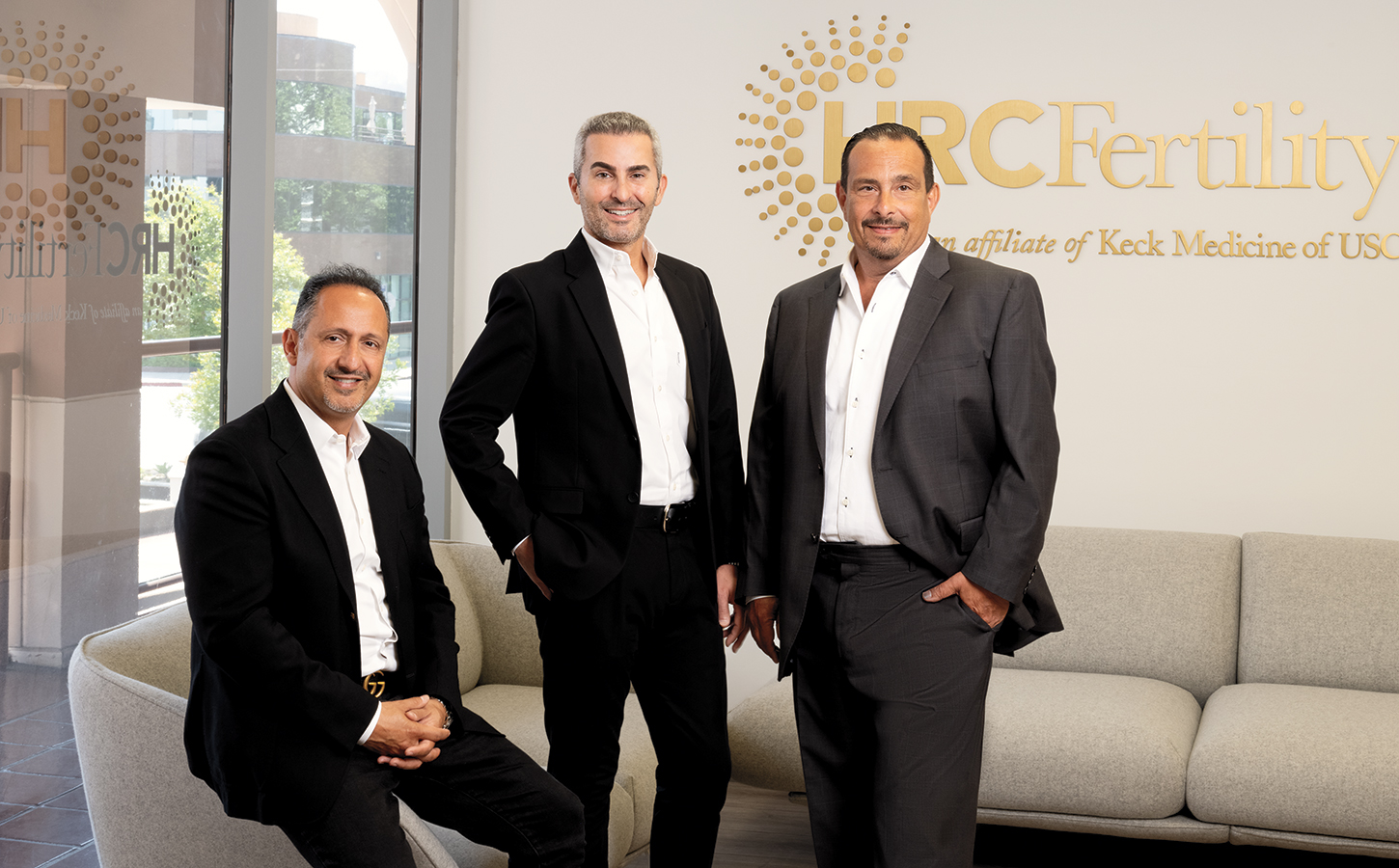HRC Fertility

-
Robert Boostanfar, MD
Shahin Ghadir, MD
David Tourgeman, MD -
Locations
8929 Wilshire Blvd., Suite 320, Beverly Hills
15503 Ventura Blvd., Suite 200, Encino -
Phone
866-472-4483
-
Website | Social
havingbabies.com | @drshahinghadir
@davidtourgemanivf | @drboostanfarivf - Special Section
Since 1988, HRC Fertility has aided hopeful parents in building families by providing them with assisted reproductive technology and personalized, compassionate care. Physicians Shahin Ghadir, MD, David Tourgeman, MD, and Robert Boostanfar, MD, along with the practice’s skilled staff members, share the journey to parenthood with patients from the first consultation until pregnancy. HRC Fertility was honored by Newsweek as one of America’s Best Fertility Clinics in 2023.
Dr. Boostanfar joined HRC Fertility in 2002 after earning his medical degree at the University of Southern California and completing a residency in obstetrics and gynecology at LAC+USC Medical Center Women’s and Children’s Hospital. Dr. Tourgeman joined the practice in 2005. He completed medical school, a residency and a fellowship at USC Keck School of Medicine, where he currently serves as assistant professor. Dr. Ghadir joined HRC early this year and has 18 years of experience in medicine. He graduated first in his class from the Central University School of Medicine and completed a residency at Kaiser Permanente Los Angeles Medical Center. He received fellowship training in reproductive endocrinology and infertility at the David Geffen School of Medicine at UCLA.
What led to your choice of this career field?
Dr. Ghadir: I decided to enter the field of reproductive medicine because it has always advanced technologically at a rapid pace, which was very exciting for me on the research side and also the clinical side. It has been an honor to help beautiful families grow while doing what I love most in this world.
Dr. Tourgeman: When I started medical school, I thought I would be a neurosurgeon. However, during my clinical rotations, I realized that my personality was better suited for assisting in the commencement of life. This brought me to the field of obstetrics and gynecology. I then further pursued a fellowship in reproductive endocrinology and infertility as it represented cutting-edge research and technology in the field of gynecology and allowed me to assist couples in bringing life into the world.
Dr. Boostanfar: I am passionate about helping couples and individuals who dream of starting a family. I am dedicated to staying on the cutting edge of medical research and technology, utilizing the latest advances to develop new treatments and improve outcomes for my patients. As a reproductive endocrinologist, I play a critical role in helping people build the families they desire, and my work is deeply fulfilling on both a personal and professional level.
What are the biggest challenges to fertility health care right now?
Dr. Tourgeman: The recent Alabama Supreme Court ruling on embryos being considered children has had a tremendous ill effect by discouraging many patients from seeking medical attention. Beyond the widespread and concerning implications, the decision contains scientific and legal inaccuracies. The system has abandoned people and hindered their reproductive rights to potentially have children.
What top traits make a great business leader?
Dr. Boostanfar: Excellent communication skills, the ability to inspire and motivate others, a strong work ethic, honesty and integrity, strategic thinking and the ability to adapt to change. Great leaders are often visionary, innovative, empathetic, and possess a deep understanding of their industry and market. They lead by example, are decisive and take calculated risks when necessary. Additionally, great leaders are always learning and growing, seeking feedback, and striving to improve themselves and their organizations.
How are your social connections beneficial?
Dr. Ghadir: My ability to socially connect to individuals and families and people of all cultures and ages has allowed me to successfully grow my practice and help people from around the world. Social connection is the root of all successful human connection, especially in the field of medicine.
How do you build connections in business?
Dr. Boostanfar: Building connections allows you to establish relationships, build trust and create opportunities for collaboration and growth. Here are a few ways to make that happen: 1. Attend networking events. Bring business cards and engage in meaningful conversations. 2. Utilize social media to connect with industry professionals. 3. Join industry-specific professional organizations to meet like-minded professionals and build your network. 4. Volunteer your time and skills to a local nonprofit organization. 5. After meeting someone new, be sure to follow up with them to stay in touch. Building connections takes time and effort, but the rewards are worth it.
How do you prioritize team culture?
Dr. Ghadir: Being a natural team player has allowed me to work in large groups successfully and motivate people around me to rise up to their maximum potential. It has allowed me to learn about what I do best when I’m involved in the improvement of health care. Our ability to work with other people successfully has helped our clinic progress to higher levels than ever anticipated.
How do you foster positive relationships?
Dr. Tourgeman: In the field of medicine, communication is paramount. Whether it is educating patients about their medical condition or a procedure, it is important for the patient to understand so they can make informed decisions in their care. We strive to do this even at a nursing level, which is critical for providing confidence and certainty.
Photographed by Jeffrey Fiterman




